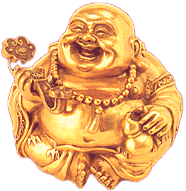|
|



|
Random Image
The Dhammapada
Chapter One: Dichotomies
The Dhammapada is an ancient Buddhist scripture traditionally ascribed to the Buddha himself. It is one of the best-known of all Buddhist texts. The word 'Dhammapada' essentially means "the path of eternal truth." According to tradition, the Dhammapada's verses were spoken by the original Siddhārtha Gautama Buddha on various occasions around 500 BC.
The chapters of the book are presented here in their original order starting with this one.
All experience is preceded by mind,
Led by mind,
Made by mind.
Speak or act with a corrupted mind,
And suffering follows
As the wagon wheel follows the hoof of the ox.
All experience is preceded by mind,
Led by mind,
Made by mind.
Speak or act with a peaceful mind,
And happiness follows
Like a never-departing shadow.
"He abused me, attacked me,
Defeated me, robbed me!"
For those carrying on like this,
Hatred does not end.
"She abused me, attacked me,
Defeated me, robbed me!"
For those not carrying on like this,
Hatred ends.
Hatred never ends through hatred.
By non-hate alone does it end.
This is an ancient truth.
Many do not realize that
We here must die.
For those who realize this,
Quarrels end.
Whoever lives
Focused on the pleasant,
Senses unguarded,
Immoderate with food,
Lazy and sluggish,
Will be overpowered by Mara,
As a weak tree is bent in the wind.
Whoever lives
Focused on the unpleasant,
Senses guarded,
Moderate with food,
Faithful and diligent,
Will not be overpowered by Mara,
As a stone mountain is unmoved by the wind.
Whoever is defiled
And devoid of self-control and truth,
Yet wears the saffron robe,
Is unworthy of the saffron robe.
Whoever has purged the defilements,
Is self-controlled, truthful,
And well established in virtue,
Is worthy of the saffron robe.
Those who consider the inessential to be essential
And see the essential as inessential
Don't reach the essential,
Living in the field of wrong intention.
Those who know the essential to be essential
And the inessential as inessential
Reach the essential,
Living in the field of right intention.
As rain penetrates
An ill-thatched house,
So lust penetrates
An uncultivated mind.
As rain does not penetrate
A well-thatched house,
So lust does not penetrate
A well-cultivated mind.
One who does evil grieves in this life,
Grieves in the next,
Grieves in both worlds.
Seeing one's own defiled acts brings grief and affliction.
One who makes merit rejoices in this life,
Rejoices in the next,
Rejoices in both worlds.
Seeing one's own pure acts brings joy and delight.
One who does evil is tormented in this life,
Tormented in the next,
Is tormented in both worlds.
Here he is tormented, knowing, "I have done evil."
Reborn in realms of woe, he is tormented all the more.
One who makes merit is delighted in this life,
Delighted in the next,
Is delighted in both worlds.
Here she is delighted, knowing, "I have made merit."
Reborn in realms of bliss, she delights all the more.
One who recites many teachings
But, being negligent, doesn't act accordingly,
Like a cowherd counting others' cows,
Does not attain the benefits of the contemplative life.
One who recites but a few teachings
Yet lives according to the Dharma,
Abandoning passion, ill will, and delusion,
Aware and with mind well freed,
Not clinging in this life or the next,
Attains the benefits of the contemplative life.
...excerpt from The Dhammapada
Continue to Chapter Two...



Contact • Feedback • Typo • Privacy • Home